Kurdish is a member of the Western Iranian branch of Indo-European languages. It is spoken in parts of Iraq, Turkey, Iran, Syria, Lebanon, Armenia, Georgia, Kyrgyzstan, Azerbaijan, Kazakstan and Afghanistan. In 2010 an estimiated 20-30 million people spoke Kurdish.
There are a number of varieties of Kurdish, which are not mutually intelligible.
Central Kurdish is an offical language in Iraq. along with Arabic.
Before 2002, there were many restrictions on the use of Kurdish in Turkey, especially in education and the media. However, since then then the use of Kurdish has gradually increased as most of these restrictions have been lifted. It is now used on radio and television, in schools, in local government, and on road signs.
In Iran Kurdish is recognized as a regional language. It is used in some local media, but not in public schools.
Kurdish began to appear in writing in a version of the Persian alphabet during the 7th century AD. However, for much of their history, the Kurds have prefered to use Arabic, Persian or Turkish for their literary works. The first well-known Kurdish poet was Ell Herirl (1425-1495), and Kurdish literature started to become popular during the 16th century.
From the 17th century Kurmanji Kurdish was sometimes written with the Yezidi script, the origins of which possibly go back to the 13th century, although no earlier manuscripts are known. Since 2013 the Spiritual Council of Yezidis in Georgia has been using the Yezidi script to write religious works and some other works.
Since 1932 Kurdish has been written with the Latin alphabet in Turkey and Syria. Before then, it was written with a version of the Arabic script. In parts of the former USSR it is written with a version of the Cyrillic alphabet, which was devised in 1946 by Heciyê Cindî (1908-1990), a Kurdish linguist from Armenia.
From 1921 to 1928 Kurdish was written with a version of the Armenian alphabet in the Armenian Soviet Socialist Republic. It was written with a version of the Latin alphabet from 1928, which was reformed in 1929.
When Kurdish is written with the Arabic script, Arabic loan words retain their original spelling, though are often pronounced quite differently in Kurdish.
Between 1920 and 1929 Kurdish was written with a version of the Armenian alphabet in Soviet Armenia.
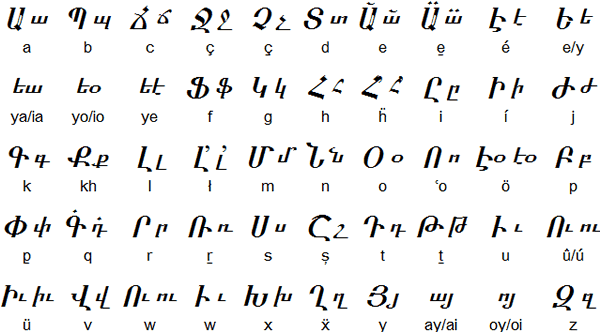
This version of the Latin alphabet for Kurdish is known as the Hawar alphabet. It is was invented by Jeladet Ali Bedirkhan (1893-1951), and was presented in his magazine, Hawar in the 1932. It is the main alphabet used for Northern Kurdish, but is not recognised in Turkey.
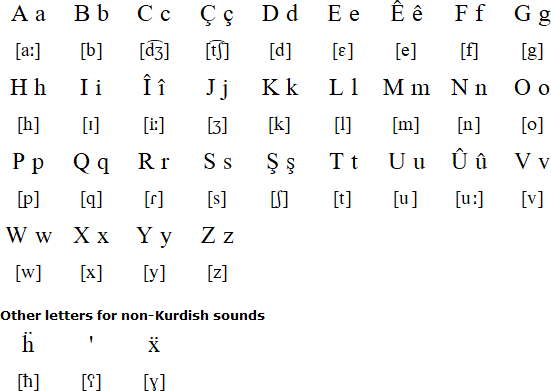
The Kurdish Unified Alphabet was devised by the Kurdish Academy of Language, and can be used to write all varieties of Kurdish.
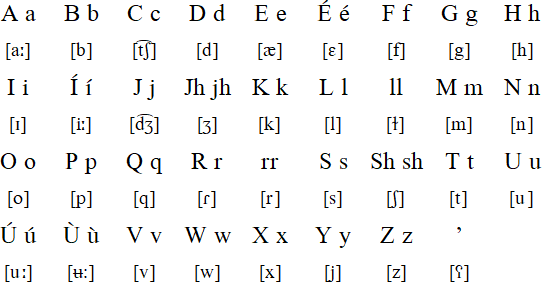
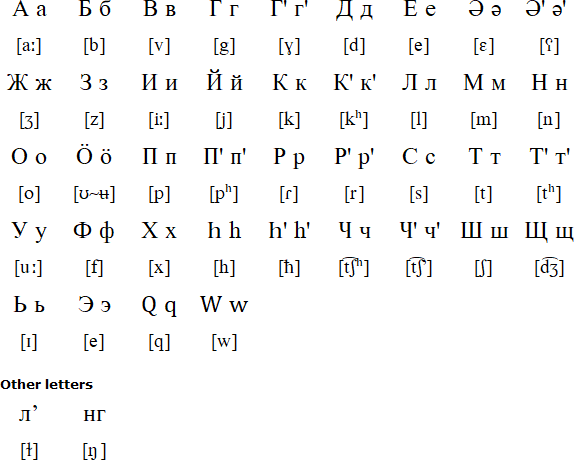
The Soranî alphabet for Central Kurdish was devised by Sa'ad Sidqi Kaban and Taufiq Wahby in the 1920s. It became the standardized form of written Kurdish used in Iran. It was also used in Iraq. The name Soranî comes from the Soran Emirate, a former Kurdish emirate that was located in the area now known as Iraqi Kurdistan.
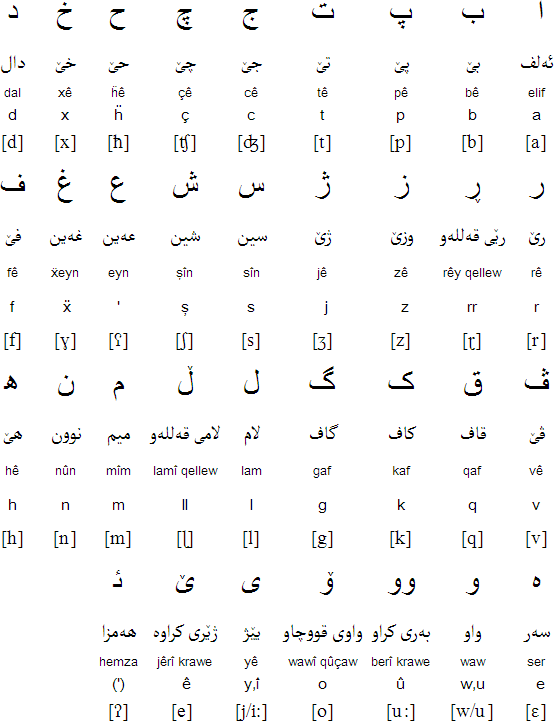

Download alphabet charts for Kurdish (Excel)
.هەموو مرۆڤ ئازاد و دوەقار و مافان دە وەکهەڤ تێن دنیایێ. ئەو خوەدی هش و شوئوورن و دڤێ لهەمبەر هەڤ بزهنیەتەکە براتیێ بلڤن
Improvements to these charts and sample text in the Arabic alphabet provided by Michael Peter Füstumum
Hemû mirov azad û di weqar û mafan de wekhev tên dinyayê. Ew xwedî hiş û şuûr in û divê li hember hev bi zihniyeteke bratiyê bilivin.
All human beings are born free and equal in dignity and rights. They are endowed with reason and conscience and should act towards one another in a spirit of brotherhood.
(Article 1 of the Universal Declaration of Human Rights)
Information about Kurdish | Phrases (Kurmanji) | Phrases (Sorani) | Numbers (Kurmanji) | Numbers (Soranî) | Yezidi alphabet | Tower of Babel | Learning materials
Information about Kurdish
http://en.wikipedia.org/wiki/Kurdish_language
https://en.wikipedia.org/wiki/Kurdish_alphabets
http://www.institutkurde.org/en/language/
http://www.kurdishacademy.org/
Other Kurdish alphabets
http://archive.org/stream/ancientalphabet00conggoog#page/n93/mode/2up
Online Kurdish lessons
https://mylanguages.org/kurdish_phrases.php
http://www.digitaldialects.com/Kurdish.htm
https://kurdishlessons.com/80-everyday-kurdish-expressions/
Kurdish phrases
http://www.wikihow.com/Learn-Key-Phrases-in-Kurdish
http://polyglotclub.com/language/kurdish/post/5071
http://wikitravel.org/en/Kurdish_phrasebook
http://learn101.org/kurdish_phrases.php
Online Kurdish dictionaries
http://www.ferheng.org
https://dictio.kurditgroup.org/dictio/
https://www.lexilogos.com/english/kurdish_dictionary.htm
Kurdish fonts
http://www.skytower.org/~ernstjtremel/OpenTypeFont_KurdishAllAlphabets.htm
Kurdish search engine and links directory
http://www.kurdishworld.com
The Encyclopedia of Kurdistan
http://www.kurdistanica.com
Avestan, Bactrian Baluchi, Bartangi, Dari, Gilaki, Hazaragi, Ishkashimi, Judeo-Persian, Juhuri, Khufi, Kumzari, Kurdish, Luri, Mazandarani, Munji, Ossetian, Ormuri, Oroshor, Persian, Parthian, Pashto, Rushani, Sanglechi, Sarikoli, Shabaki, Shughni, Tajik, Talysh, Tat, Wakhi, Wanetsi, Yaghnobi, Yazghulami, Yidgha, Zazaki
Adamaua Fulfulde, Afrikaans, Arabic (Algerian), Arabic (Bedawi), Arabic (Chadian), Arabic (Egyptian), Arabic (Gulf), Arabic (Hassaniya), Arabic (Hejazi), Arabic (Lebanese), Arabic (Libyan), Arabic (Modern Standard), Arabic (Moroccan), Arabic (Najdi), Arabic (Sudanese), Arabic (Syrian), Arabic (Tunisian), Arwi, Äynu, Azeri, Balanta-Ganja, Balti, Baluchi, Beja, Belarusian, Bosnian, Brahui, Chagatai, Chechen, Chittagonian, Comorian, Crimean Tatar, Dargwa, Dari, Dhatki, Dogri, Domari, Gawar Bati, Gawri, Gilaki, Hausa, Hazaragi, Hindko, Indus Kohistani, Kabyle, Kalkoti, Karakalpak, Kashmiri, Kazakh, Khowar, Khorasani Turkic, Khwarezmian, Konkani, Kumzari, Kurdish, Kyrgyz, Lezgi, Lop, Luri, Maba, Maguindanao, Malay, Malay (Terengganu), Mandinka, Marwari, Mazandarani, Mogholi, Morisco, Mozarabic, Munji, Noakhailla, Nubi, Ormuri, Palula, Parkari Koli, Pashto, Persian/Farsi, Punjabi, Qashqai, Rajasthani, Rohingya, Salar, Saraiki, Sawi, Serer, Shabaki, Shina, Shughni, Sindhi, Somali, Soninke, Tatar, Tausūg, Tawallammat Tamajaq, Tayart Tamajeq, Ternate, Torwali, Turkish, Urdu, Uyghur, Uzbek, Wakhi, Wanetsi, Wolof, Xiao'erjing, Yidgha
Abaza, Abkhaz, Adyghe, Aghul, Akhvakh, Akkala Sámi, Aleut, Altay, Alyutor, Andi, Archi, Assyrian / Neo-Assyrian, Avar, Azeri, Bagvalal, Balkar, Bashkir, Belarusian, Bezhta, Bosnian, Botlikh, Budukh, Bulgarian, Buryat, Chamalal, Chechen, Chelkan, Chukchi, Chulym, Chuvash, Crimean Tatar, Dargwa, Daur, Dolgan, Dungan, Enets, Erzya, Even, Evenki, Gagauz, Godoberi, Hinukh, Hunzib, Ingush, Interslavic, Itelmen, Juhuri, Kabardian, Kaitag, Kalderash Romani, Kalmyk, Karaim, Karakalpak, Karata, Karelian, Kazakh, Ket, Khakas, Khanty, Khinalug, Khorasani Turkic, Khwarshi, Kildin Sámi, Kili, Komi, Koryak, Krymchak, Kryts, Kubachi, Kumandy, Kumyk, Kurdish, Kyrgyz, Lak, Lezgi, Lingua Franca Nova, Lithuanian, Ludic, Macedonian, Mansi, Mari, Moksha, Moldovan, Mongolian, Montenegrin, Nanai, Negidal, Nenets, Nganasan, Nivkh, Nogai, Old Church Slavonic, Oroch, Orok, Ossetian, Pontic Greek, Romanian, Rushani, Russian, Rusyn, Rutul, Selkup, Serbian, Shor, Shughni, Siberian Tatar, Sirenik, Slovio, Soyot, Tabassaran, Tajik, Talysh, Tat, Tatar, Teleut, Ter Sámi, Tindi, Tofa, Tsakhur, Tsez, Turkmen, Tuvan, Ubykh, Udege, Udi, Udmurt, Ukrainian, Ulch, Urum, Uyghur, Uzbek, Veps, Votic, Wakhi, West Polesian, Xibe, Yaghnobi, Yakut, Yazghulami, Yukaghir (Northern / Tundra), Yukaghir (Southern / Kolyma), Yupik (Central Siberian)
Languages written with the Latin alphabet
Page last modified: 29.06.24
[top]
You can support this site by Buying Me A Coffee, and if you like what you see on this page, you can use the buttons below to share it with people you know.

If you like this site and find it useful, you can support it by making a donation via PayPal or Patreon, or by contributing in other ways. Omniglot is how I make my living.
Note: all links on this site to Amazon.com, Amazon.co.uk
and Amazon.fr
are affiliate links. This means I earn a commission if you click on any of them and buy something. So by clicking on these links you can help to support this site.
[top]